~ The Righteous Life ~
Born on 15 October 1931 at Rameswaram in Tamil Nadu, Dr Avul Pakir Jainulabdeen Abdul Kalam specialized in Aeronautical Engineering from Madras Institute of Technology. Dr Kalam is one of the most distinguished scientists of India and has been awarded the Padma Bhushan (1981), the Padma Vibhushan (1990) and Indias highest civilian award, the Bharat Ratna (1997).
Dr Kalam became the eleventh President of India on
25 July 2002. His focus and greatest ambition remains finding ways that will transform India into a developed nation.
Also in the same series:
Timeless Malgudi: The Very Best of R.K. Narayan
The Writer on the Hill: The Very Best of Ruskin Bond
Published by
Rupa Publications India Pvt. Ltd 2014
7/16, Ansari Road, Daryaganj
New Delhi 110002
Sales centres:
Allahabad Bengaluru Chennai
Hyderabad Jaipur Kathmandu
Kolkata Mumbai
Copyright A.P.J. Abdul Kalam 2014
Introduction copyright Sudeshna Shome Ghosh 2014
Page 225 is extension of the copyright page.
First impression 2014
10 9 8 7 6 5 4 3 2 1
Printed at [PRINTERs NAME, CITY]
This book is sold subject to the condition that it shall not, by way of trade or otherwise, be lent, resold, hired out, or otherwise circulated, without the publishers prior consent, in any form of binding or cover other than that in which it is published.
Contents
Where there is righteousness in the heart,
There is beauty in the character.
When there is beauty in the character,
There is harmony in the home.
When there is harmony in the home,
There is order in the nation.
When there is order in the nation,
There is peace in the world.
Introduction
 VUL PAKIR Jainulabdeen Abdul Kalams life story has been written about and recorded by himself and others many times. The story of a boy from a small coastal town in south India, one of many siblings, who goes out into the wide world, excels in scientific research and mission management and finally becomes the eleventh President of India, is the quintessential Indian story of hard work, intelligence and tenacity. Yet Dr Kalams life or his thoughts can hardly be contained in only his story. Like a stone tossed into a pond, his life has given rise to so many ripples, each growing wider, each touching other minds and other lives.
VUL PAKIR Jainulabdeen Abdul Kalams life story has been written about and recorded by himself and others many times. The story of a boy from a small coastal town in south India, one of many siblings, who goes out into the wide world, excels in scientific research and mission management and finally becomes the eleventh President of India, is the quintessential Indian story of hard work, intelligence and tenacity. Yet Dr Kalams life or his thoughts can hardly be contained in only his story. Like a stone tossed into a pond, his life has given rise to so many ripples, each growing wider, each touching other minds and other lives.
The beginning lies in a house near the Bay of Bengal, in Rameswaram, a town known throughout the country as an important pilgrimage spot for Hindus. It was not the most luxurious of homes but one filled with love and piety. Little Abduls father was a prominent Muslim inhabitant of the island and Abdul deeply admired and respected him. In his books Wings of Fire and My Journey, he has written about his fatherhis faithfulness, his contemplativeness and how he helped people with his sage advice and prayers. Abduls mother was an equally big influence on him. He describes her as busy, efficient, keeping a large household running on a limited budget yet never stinting on her love or time with him. He was, he has written, perhaps her favourite child, often allowed to rest his head on her lap when all the others had been sent to bed. From that memory of warmth came this poem:
Mother
I still remember the day when I was ten,
Sleeping on your lap to the envy of my elder brothers and sisters.
It was full moon night, my world only you knew Mother,
My Mother!
When at midnight, I woke with tears falling on my knee
You knew the pain of your child, My Mother.
Your caring hands, tenderly removing the pain
Your love, your care, your faith gave me strength,
To face the world without fear and with His strength.
We will meet again on the great Judgment Day.
My Mother!
Kalams descriptions of growing up in Rameswaram, his teachers, his school friends, tutors, cousins and the everyday life of a small town at the time of Indias Independence are some of the most interesting and poignant parts of his writing. His first job as a newspaper delivery boy, the easy coexistence of people from different religions in a town famous for its Shiva temple, the various moods of the sea and the tides have all been described by him and eventually shaped who he became.
From Rameswaram, Kalam went to Ramanathapuram, Trichi and then Madras for his higher studies, finally graduating in engineering. In all these places he had teachers who influenced him and left their mark on his mind, making him more open and confident while also opening up a new world of scientific thinking to him. The first such teacher was Iyadurai Solomon, at Schwartz High School, Ramanathapuram, of whom he writes:
In his company, I learnt that one could exercise enormous influence over the events of ones own life. Iyadurai Solomon used to say, To succeed in life and achieve results, you must understand and master three mighty forcesdesire, belief and expectation. Iyadurai Solomon was a great teacher because he instilled in all the children a sense of their own worth. Solomon raised my self-esteem to a high point and convinced me, the son of parents who had not had the benefits of education, that I too could aspire to become whatever I wished. With faith, you can change your destiny, he would say.
Other teachers followed who saw the spark in the shy but bright boy in their class and took him under their wings. He has written and spoken about the importance of teachers in the development of the mind of the child and went on to become a passionate teacher himself, holding large gatherings of students, adults, even world leaders in his thrall. His vision of education and teaching goes beyond the classroom, to this:
For enabling empowerment of the students, we need teachers who love teaching. The teacher should realize that he or she has to ignite the minds of the youth which is the most powerful resource on the earth, above the earth and under the earth. The teacher becomes a great teacher only when he or she is able to lift the average student to excellent performance by way of special teaching techniques. The conduct of the teacher inside and outside the school should become a great message to the student in shaping their career. The teacher has to fill his or her mind with great thoughts and spread the nobility in thinking and action.
While studying in Madras, Kalam had become fascinated by flying and aircraft engineering. He had set his heart on becoming an Air Force pilot. However, he narrowly missed making it, and took up a job at the Directorate of Technical Development & Production (Air) as Senior Scientific Assistant. From there, as he got involved in various defence and aeronautical projects, he was recruited by Dr Vikram Sarabhai into the Indian National Committee for Space Research (INCOSPAR), the forerunner of what would become the Indian Space Research Organisation (ISRO). Dr Sarabhai, charged with developing an indigenous space programme for the country, had drawn up a vision document to achieve this, and Kalam ended up playing a key role in this. He has written in detail about the leadership qualities he learnt from stalwarts like Dr Vikram Sarabhai, Prof. Satish Dhawan and Dr Brahm Prakash.
Some of what he learnt while leading large complicated projects is distilled here:
Anyone who has taken up the responsibility to lead a team can be successful only if he is sufficiently independent, powerful and influential in his own right to become a person to reckon with. This is perhaps also the path to individual satisfaction in life, for freedom with responsibility is the only sound basis for personal happiness. What can one do to strengthen personal freedom?... First, by building your own education and skills. Knowledge is a tangible assetThe second way is to develop a passion for personal responsibility.

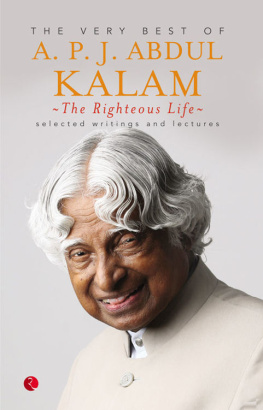
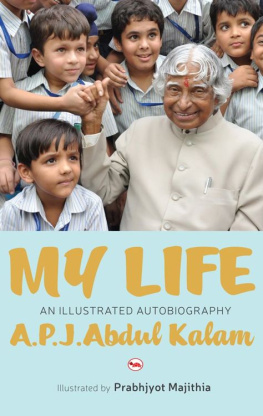
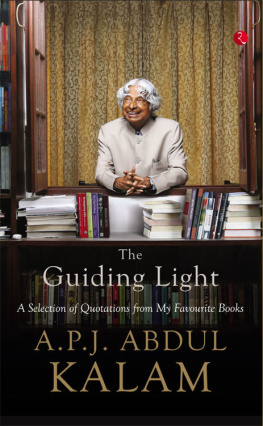

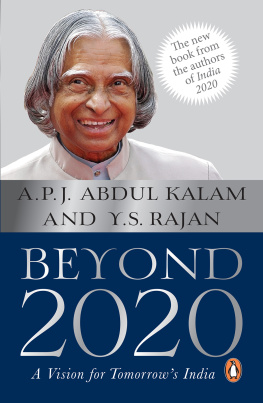
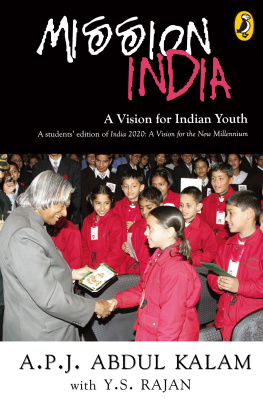
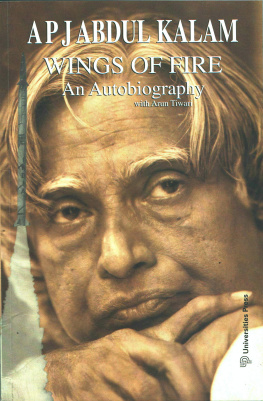
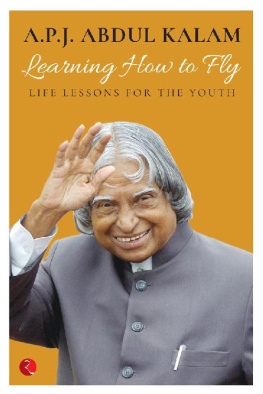
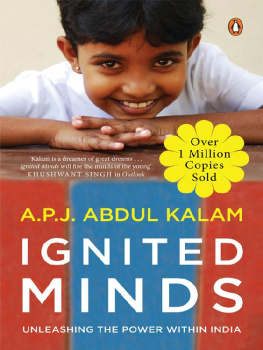
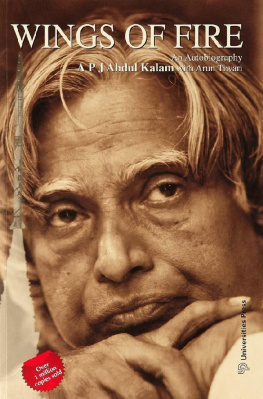
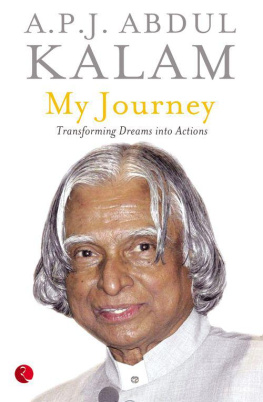

 VUL PAKIR Jainulabdeen Abdul Kalams life story has been written about and recorded by himself and others many times. The story of a boy from a small coastal town in south India, one of many siblings, who goes out into the wide world, excels in scientific research and mission management and finally becomes the eleventh President of India, is the quintessential Indian story of hard work, intelligence and tenacity. Yet Dr Kalams life or his thoughts can hardly be contained in only his story. Like a stone tossed into a pond, his life has given rise to so many ripples, each growing wider, each touching other minds and other lives.
VUL PAKIR Jainulabdeen Abdul Kalams life story has been written about and recorded by himself and others many times. The story of a boy from a small coastal town in south India, one of many siblings, who goes out into the wide world, excels in scientific research and mission management and finally becomes the eleventh President of India, is the quintessential Indian story of hard work, intelligence and tenacity. Yet Dr Kalams life or his thoughts can hardly be contained in only his story. Like a stone tossed into a pond, his life has given rise to so many ripples, each growing wider, each touching other minds and other lives.